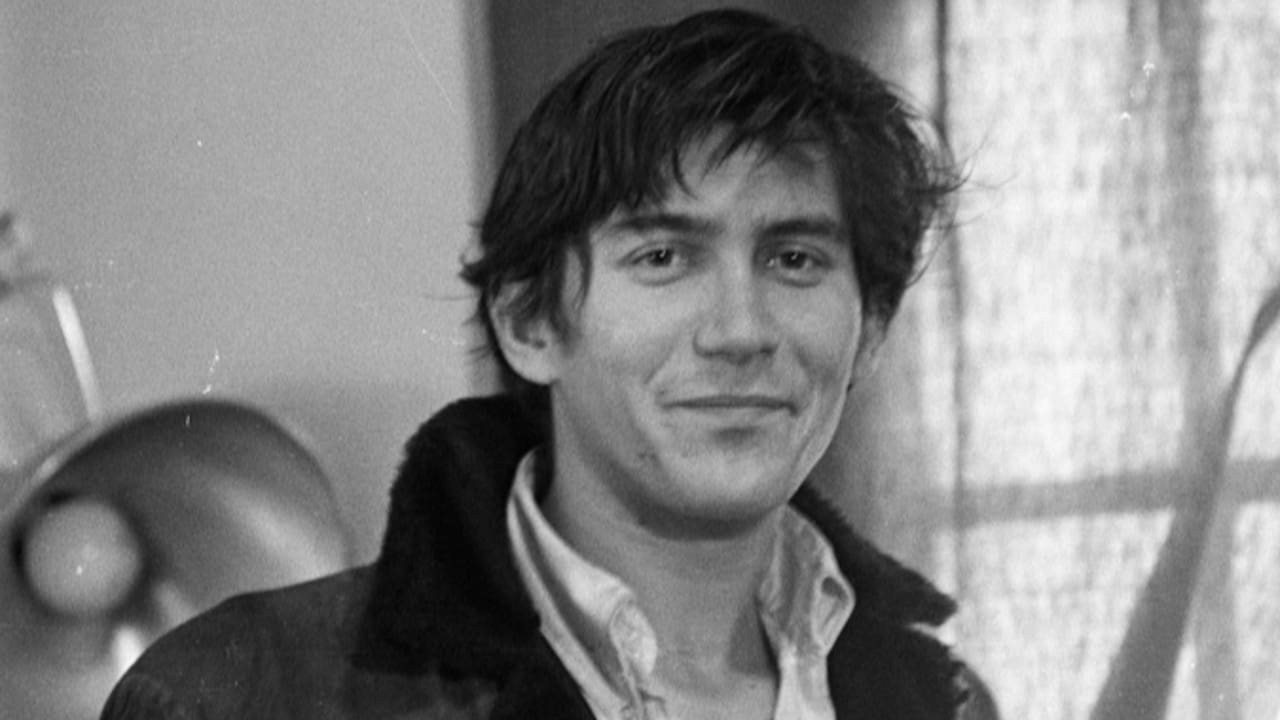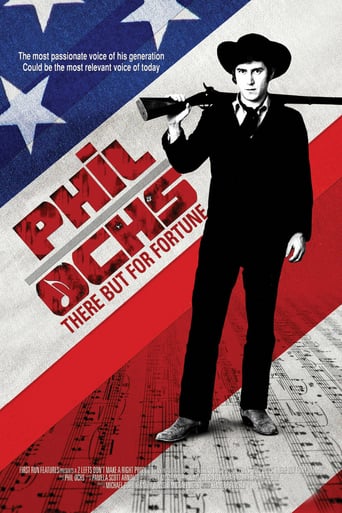

Phil Ochs: There But for Fortune (2010) was written and directed by Kenneth Bowser. Phil Ochs was a brilliant political singer/songwriter during the 1960's and into the 1970's. Phil wrote and sang about some of the most horrible years in U.S. history--the war in Vietnam raging, the civil rights protesters being beaten and arrested, the police riot at the 1968 Democratic Party convention, and the CIA's brutal intervention in places like Chile. My wife and I were active in the peace and justice movement, and we became very active in 1969. (We are still peace and justice activists.) The political folksingers like Pete Seeger, John Baez, and Phil Ochs provided us with inspiration, determination, and courage. Now, almost 50 years latter, most people have boiled down what we did to making the peace sign and saying "make love not war." We did those things, but we did much, much more, and we did them to the songs of the political folksingers like Phil Ochs.The film is unusual because we don't get much footage of Phil Ochs talking about his work. We hear him singing, and we get a few clips of him talking, but mostly we hear other people talking about Ochs. These include singers and activists like Erik Andersen, Joan Baez, Billy Bragg, Bob Dylan, Sean Penn, Pete Seeger, Dave Van Ronk, Tom Hayden, and Judy Henske. In addition, Phil's brother, wife, and daughter reminisce about Phil. (There's also footage of combat in Vietnam, in Chicago, and in the southern U.S.)This is an excellent movie, but a somewhat discouraging one. We in the peace and justice movement felt as if we were pushing against a solid brick wall. We couldn't bring it down. In fact, we couldn't make a dent in it. And, all the while, we knew that the FBI was watching us. (The FBI had hundreds of pages of reports on Phil Ochs.)Singers like Phil Ochs gave of themselves to help keep the peace and justice movement alive. However, he paid a price for his singing, and after a while, his situation spiraled down, out of control.We saw the movie on DVD, where it worked well. It's not a must-see movie, except for peace activists and people interested in the history of the peace movement. The film certainly validates the anger and discouragement we felt. More important, it demonstrates the uplifting quality of really great protest songs. That makes it a good movie for everyone.
... View MoreDocumentaries can offer more than just their subject matter; they have the power to thrust a personal story of a well known or abstract figure into a greater, historical, microcosmic portrait, or to turn a historical triumph or tragedy into something we can experience almost personally. This film seems to accomplish both of these feats. I've respected and enjoyed Phil Ochs' music and message, in the sense that the melodies are pleasant and heartfelt, and the message is in turns earnest and bitingly sardonic. To a person growing up with punk music like myself, this seems like a logical precursor. But this film takes the story of another widely forgotten musician and gives us a portrait of a wildly ambitious human being, a flawed hero, and the explosive world around him. As a rampant idealist myself, the story is both encouraging and all too heart-breaking. It hits all of us would-be activists and creative, motivated, inspired, loving seekers of change, right in the heart. In the end of this narrative, the world didn't bend for this one ego, after all; and it may have helped crush the very soul of this talented "egomaniac" (as a friend calls him).And yet, he fought anyways. Ochs straddled a thin line between impassioned activist and self-indulgent artist, and in the ensuing battle, between integrity and ambition, between idealism and caution, he lost his family, his voice, and his own sanity. Yet there's a fascinating counterpoint that one can draw from this film: we can clearly see which side of this battle that artists like Dylan fell on--the personal, apolitical side which made broad illusions but focused on staying more accessible (though less and less vital) than Ochs and his blatant, confrontational intelligence. But I think that this is the true yet sadly forgotten and maligned legacy of the 1960s; not the crappy, burned-out stoner rock, psychedelic escapism and superficial "groovy love" garbage, but the real radicals trying to affect change, and their various approaches, successes and failures. And this is where the film serves as an important historical/cultural record. We all know about Civil Rights, the War, and the anti-war movement, as separate events. This film ties them all together with one singular character, who is himself, successor to another forgotten tradition; the activist/troubadour. But he is never really a hero, but a human being, and this is another strength of the film: it doesn't seek to merge all of the "Phil Ochs" narratives into a consolidated image, but each friend, family member or acquaintance is allowed to recall their impressions of Ochs and the folk scene, stories which are often, at times, very much at odds. Was his suicide a natural progression from his alcoholism? Was it a family history of mental illness? Or did his "defeat" at being no more than an ineffective pop artist, in the shadow of real heroes such as Guevara and his executed Chilean folk hero, crush him? We get different impressions from different stories, and the film doesn't try to answer all of the questions. It gives you music, words, live performances, juxtaposed with the scenes of the real life change, the volatile condition of the world, as it happened around an artist. And it was this change that began long before the self-congratulatory hippies spent their summers of self-love seeking chemical bliss. The modern parallels are frightening and, quite frankly depressing, as it looks as if my generation will never produce anyone so high-profile and well known, with that much intelligence, courage and heart. And if they do exist, the media industries certainly won't bother giving them a voice. We now live in a world that seems to sit back, and look cool and detached as the same injustices take shape all around us. And if that doesn't make this film more relevant than ever, I'm not sure what could.
... View MoreI went originally to see this documentary because I loved Ochs music - even played some of it badly at one time - but feared it might simply be a 'trip down memory lane'. But the film is so much more than a bio of Ochs and his music or - thank god - just an exercise in nostalgia. It really captured the power and significance of the historically altering events of the 60's - both for the country and for individuals. I wish everyone - especially young people - could see it. Ochs comments in the film that Nixon used the stereotype of a drugged out-of-control protester to present the masses with the false choice of himself or 'those'. Of course that strategy of fear and false political choices is not unique to Nixon - always existed and still does. Nonetheless,it still saddens and angers me that conservatives have succeeded so well in shaping the historical lens that most people see the 60's through now. Most people today simply think of drugs, sex, rock-and-roll, and self-indulgence when they think of the 60's. Lost is any mass knowledge of what happened in Birmingham, or to martyrs like the Philadelphia Three, or the work of thousands of sincere people like Ochs who fought for fairness. The film captures this split - how the 60's was really two segments - and just as Ochs lost his way after Chicago - so did the nation. I don't have a problem with the fact that there wasn't more musical footage of Och's music in the documentary. There was enough to present his music and place in the folk scene of his time. Other sources can fill in more of his music - and hopefully people who aren't familiar with his music will do that. One documentary cannot be three films - i.e. personal bio, musical compilation, and historical analysis. It needs to have a focus and point of view. And,for me, this film captured the power and impact of his music, and how his personal life followed - sadly - the country's loss of trust and hope.
... View More"There But for Fortune" is an excellent documentary on the life and career of the over-looked folk/protest singer Phil Ochs. Overshadowed by his contemporary (and idol) Bob Dylan, Phil Ochs never received his due. And this is greatly surprising since his music was more melodious and more "palatable" than Dylan's.Watching this movie, I am astounded that he never achieved greater notoriety. For someone who seemingly had everything going for him (good looks, a gorgeous dulcet voice and a rare gift for writing songs that alternated between beautiful and biting), it's amazing to me that he never became a bigger name.His songwriting was masterful, often touching upon topics of the day (e.g. "A Small Circle of Friends" being inspired by the Kitty Genovese story). His voice was haunting and beautiful. Songs such as "Changes" and "Pleasures of the Harbor" are simply exquisite. Phil Ochs spent the 1960s writing and performing protest music, much of it targeted at the Vietnam War ("The War is Over," "I Ain't Marchin' Anymore," etc.). Tragically - and ironically - upon the ending of the war, he became un-moored. Perhaps feeling that he had lost his purpose, he sank into a deep depression and, within a few years, was dead by his own hand. This is a very well put together film - including interviews with his brother and sister, his wife and daughter, and numerous friends in "the cause." And, luckily, there is a surprising amount of footage on this individual who never really reached a great measure of fame.Even I, someone who was always "into" popular music, had not become familiar with Phil Ochs until after he was gone. If you ask me, why this supremely talented individual was not a bigger name in American popular music is one of the mysteries of the ages. The producers of this film have done the viewing public a great service. It's just unfortunate that only those people who already know of Phil Ochs will likely go out and see it. On the other hand, this movie paints a portrait not only of Phil Ochs the singer, but of America in the 1960s. So, by all rights this film should have wider appeal as a piece of history, with Phil Ochs at the center of a very tumultuous period. One can only wonder in sadness what kind of music he would be writing today at the age of 70, given the fact that we find ourselves once again embroiled in another questionable war.
... View More